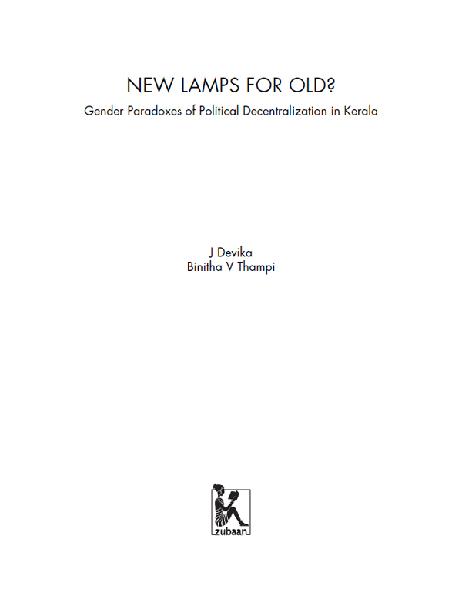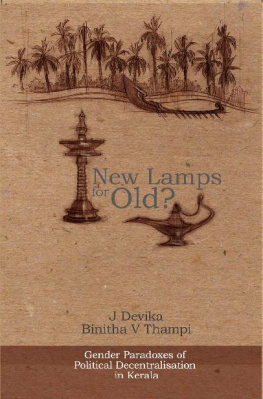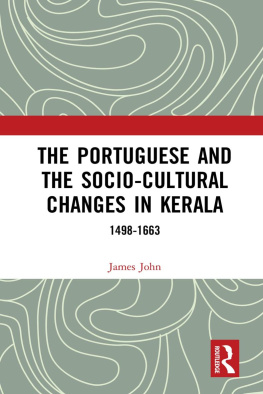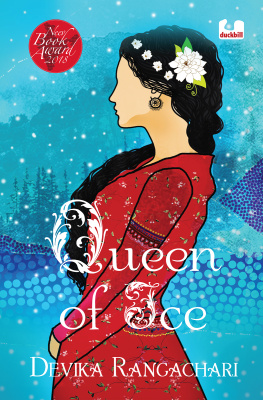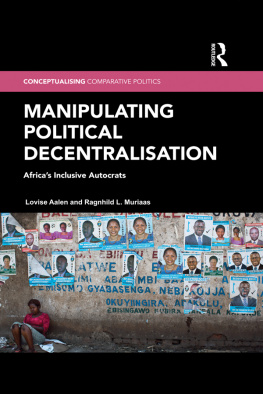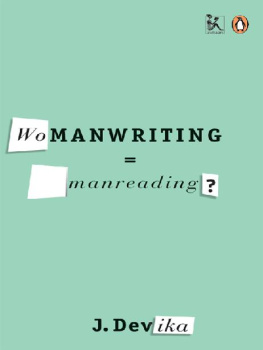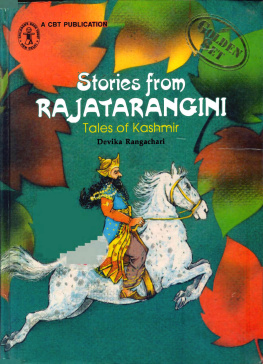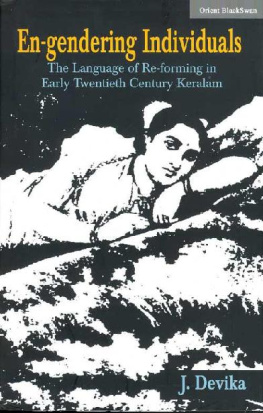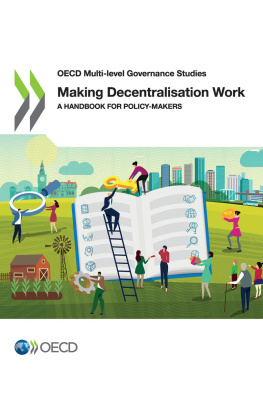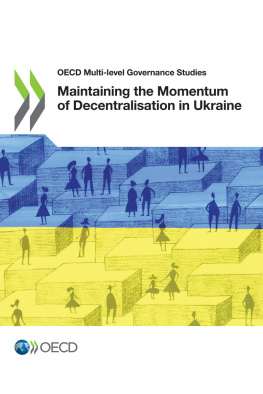ZUBAAN
an imprint of Kali for Women
128 B Shahpur Jat, 1 st floor
NEW DELHI 110 049
Email:
Website: www.zubaanbooks.com
First published by Zubaan 2012
Copyright J Devika and Binitha V Thampi 2012
All rights reserved
10 9 8 7 6 5 4 3 2 1
ISBN 978 93 81017 18 0
Ebook ISBN: 978 93 81017 39 5
This eBook is DRM-free.
Zubaan is an independent feminist publishing house based in New Delhi with a strong academic and general list. It was set up as an imprint of Indias first feminist publishing house, Kali for Women, and carries forward Kalis tradition of publishing world quality books to high editorial and production standards. Zubaan means tongue, voice, language, speech in Hindustani. Zubaan is a non-profit publisher, working in the areas of the humanities, social sciences, as well as in fiction, general non-fiction, and books for children and young adults under its Young Zubaan imprint.
Typeset by Recto Graphics, Delhi - 100 096
Printed at Raj Press, R-3 Inderpuri, New Delhi - 110 012
Contents
Acknowledgements
Yoga teachers often advise their students to stretch a bit more every day; stretching more can be painful, they tell us, but one always grows the stronger for it, and the pain ultimately metamorphoses into pleasure. This book was born out of a project, Gendering Governance or Governing Women: Politics, Patriarchy, and Democratic Decentralization in Kerala, carried out with the support of IDRC, Canada. Each of us in this project and we were a large group of women researchers has gone through stretching a bit more intellectually. There were many well-wishers who felt that this project was too ambitious. The fact that we pulled it off together was a wonderful dream come true.
This book partially builds upon the insights gained from our project, but has been fortified by more fieldwork. There are many who we remember at this moment starting with all those who generously gave their time and energy to our interviews. We have learned so much from all our interviewees that the debt we owe them can never be fully repaid. Many of them are fulltime public workers, and indeed, we cannot thank them enough. We do hope that this book will document and celebrate their struggles even when we voice our differences and disagreements with them. More generally, we hope this book will bring to light the struggles of Malayalee women of many generations to enter the political public and thus connect us critically to a generation completely forgotten now the first generation feminists of Malayalee society.
The Centre for Development Studies was, in many ways, an ideal nesting place for this project. The Registrar of CDS, Soman Nair, and Chandra in the Accounts Section were patient and generous with advice and time they are remembered with much warmth. The IDRC project brought us many new friends especially Navsharan Singh, Maitrayee Mukhopadhyay, Seema Kulkarni, and Alice, who are warmly thanked. We would also like to thank Reshma Radhakrishnan who ably supported us in the interviewing process in the early phase and Ranjith P M, who helped us with a number of crucial interviews towards the end.
Friends have guided us through this work. The team members who worked on other parts of this project, and other friends who were keenly interested in it are remembered with much affection and infinite gratitude: Usha Zacharias, A K Rajasree, Ranjini Krishnan, Santhy S, Anitha S, Rekha Raj, Reshma Bharadwaj, Gouridasan Nair, and N C Narayanan. Our early discussions on fieldwork were enriched by Vineetha Menon. Special thanks are due to Janaki Abraham, Mary John, G Arunima and the audiences at seminars at Delhi and Thiruvananthapuram, and Shamshad Hussain in Kerala who responded with critical enthusiasm to our ideas. Urvashi Butalia of Zubaan has been enthusiastic about this work right from the beginning. We thank her for her patience and friendship. There are many who helped us in other ways those who attended our inception workshop and offered useful suggestions, those who helped us reach out to women leaders of the panchayats, or find accommodation in remote places their contribution to this work is gratefully acknowledged.
As usual, our families have sacrificed much. Seethalakshmy Amma, Shibu, Anitha, Ajayan, Meenu, and many others kept us going through thick and thin. We lovingly thank them. This book is dedicated to our daughters who were amazingly patient with their mothers three-hour-long telephone conversations: we hope that Janaki, Sreeranjini and Rajashree, will grow older in a world in which women-intellectuals and womenpoliticians will not be regarded as rare or strange species.
We dont know if it is done to thank ourselves maybe we should. For it is not often that many of us take the risk of coming out of the narrow little cells that a rapidly individualizing society assigns us, of allowing ourselves to be transformed through each others insights. Time flew and we negotiated ill-health, personal losses, and other disappointments, but the interviewing and the writing went on. We do hope that the book communicates at least a share of the excitement that spurred us to write it.
J Devika and Binitha V Thampi
Introduction
Fear of Flying
Let me tell you the truth. I didnt get into this out of the desire to be zooming about the panchayat sitting in the front seat of this Jeep. I have never thought that theres anything more in this, than an opportunity to serve the people. Because I was not very familiar with public work, I did fear whether this is within my ability. I contested only on the insistence of my husband and the local folk. Well, I contested, won, and learned all the rules with a lot of effort. I have also managed to do many things here.
I think the panchayat is not a place for politics at all we women presidents have to hold everyone together and take all of us forward. Politics should end soon after the elections, and then we must all work together. So there was never any question of me playing politics, as the rumor-mongers claim.
. But it is people who are nearest to you who feel disturbed when they see you hanging on and not falling off. They say, she is zooming about in the Jeep and playing politicsthe same lowly woman who used to walk up and down our road in rubber slippers! I have never flown about like that nor have I ever even desired to fly
P re-empting questions from us on the rumors floating about the panchayat about her over-ambitious nature, a woman-president of a village panchayat in coastal Kerala presented this spirited self-defense. We were not taken by surprise. In the course of our fieldwork in Keralas panchayats studying gender, governance and politics, we had indeed noticed how the Jeepor the official vehicle of the panchayatoften proved to be the instance in which the faultlines of gender power struggles, sometimes well-concealed in politically correct responses to our questions, were revealed. The question of who controls the Jeep often stood for who held real powerand most often the woman leader of the panchayat was engaged in a tussle over this with the male local politician or male panchayat official. However, we also noticed that very few of the women who told us Jeep stories explicitly recognized their acts as resistance; they were more inclined to project themselves as hapless and innocent victims of assaults by powerful local male politicians or officials. Equally intriguing was the intense reluctance among women leaders of local self-government, who have entered the domain of local governance through the reservation of thirty-three per cent seats in the panchayati raj institutions as a result of the 73rd and 74th Amendments to the Indian Constitution, even the most successful and popular of them, to admit to political ambition in the more familiar sense of upward mobility in party politics. That is, as ambition for public-political power, understood as power from within and power to but also involving a certain degree of power over (Rowlands 1997). Many women we interviewed openly declared that their ambitions were not around political power but development. This is in sharp contrast to their male counterparts who pursue both agendas with equal fervour.
